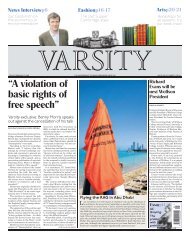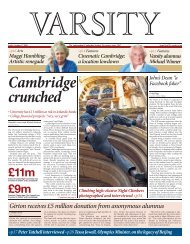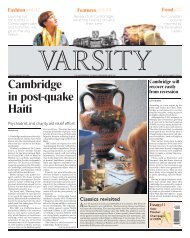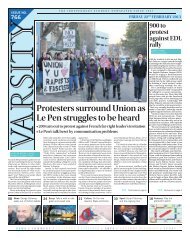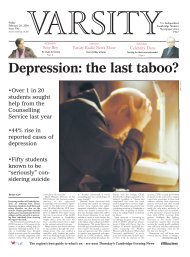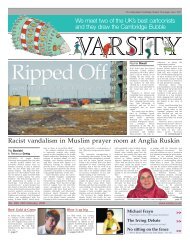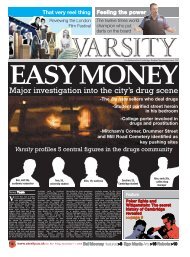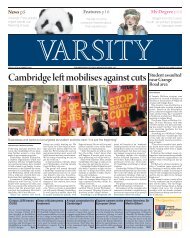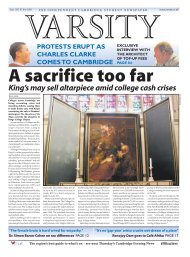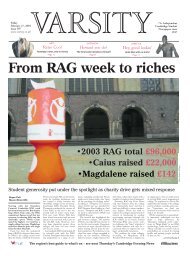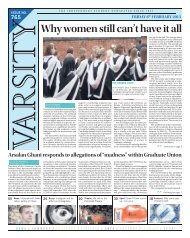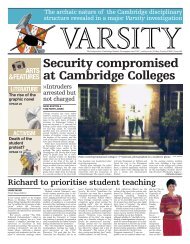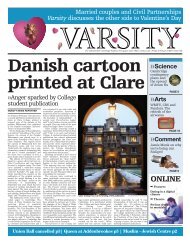John's students urinate on staircase and Corpus' sexual ... - Varsity
John's students urinate on staircase and Corpus' sexual ... - Varsity
John's students urinate on staircase and Corpus' sexual ... - Varsity
You also want an ePaper? Increase the reach of your titles
YUMPU automatically turns print PDFs into web optimized ePapers that Google loves.
9 November 2001<br />
A ARTSLITERATURE<br />
www.varsity.cam.ac.uk<br />
Writing a review of The Bible is<br />
somewhat of a minefield; likewise,<br />
reading The Bible is<br />
somewhat of a minefield. Not <strong>on</strong>ly is it a<br />
very l<strong>on</strong>g book (364 pages in a st<strong>and</strong>ard<br />
Hebrew versi<strong>on</strong>, excluding the sequel,<br />
not reviewed here), it is also c<strong>on</strong>fusing<br />
<strong>and</strong> repetitive. Maybe the best reas<strong>on</strong> for<br />
not reading it is because some parts will<br />
bore any<strong>on</strong>e who is not a lawyer or a<br />
high priest. There are many other good<br />
reas<strong>on</strong>s why <strong>on</strong>e should never glance in<br />
the general directi<strong>on</strong> of this book; an<br />
important <strong>on</strong>e to some is that it can be<br />
viewed as being deeply ‘uncool’. Still, I<br />
think it is a fine work, <strong>and</strong> <strong>on</strong>e shouldn’t<br />
surrender completely to fashi<strong>on</strong>.<br />
The Bible was probably written over a<br />
period of a few thous<strong>and</strong> years, in different<br />
places by different writers. It goes<br />
without saying that each of these writers<br />
had a very specific agenda to stress <strong>and</strong><br />
various points to make. This is probably<br />
the reas<strong>on</strong> that the book is so c<strong>on</strong>fusing.<br />
The can<strong>on</strong>ised versi<strong>on</strong> of the book (d<strong>on</strong>e<br />
in the early Middle Ages) gives a fairly<br />
c<strong>on</strong>tinuous plot, but leaves a lot to be<br />
interpreted in different ways. Think, for<br />
example, of the<br />
character of King<br />
David, who is<br />
always oscillating<br />
between approval<br />
<strong>and</strong> ridicule from<br />
various writers; or<br />
Sams<strong>on</strong>, who is<br />
clearly liked very<br />
much by the writers,<br />
but sometimes<br />
gives the impressi<strong>on</strong><br />
of being a<br />
fool. It is these<br />
inner c<strong>on</strong>flicts <strong>and</strong><br />
paradoxes that<br />
make reading The<br />
Bible interesting.<br />
The reader is made<br />
aware of the writers’<br />
intenti<strong>on</strong>s<br />
through their<br />
changing attitudes <strong>and</strong> c<strong>on</strong>tinuing<br />
debates. It is not a matter of simple char-<br />
Boring people<br />
Not (a) novel?<br />
Tim Stanley suspects it’s autobiography.... Richard Pearce de-hypes Travel Arrangements<br />
When I settled down to read<br />
No B<strong>on</strong>es I was looking forward<br />
to reading a book that<br />
wasn’t about a Catholic child growing<br />
up in the troubles in Northern Irel<strong>and</strong>.<br />
Sadly, that’s exactly what Anna Burns<br />
wants to tell us about. Ever since<br />
Truman Capote produced the first piece<br />
of journalistic ficti<strong>on</strong> no <strong>on</strong>e writes novels<br />
anymore; <strong>and</strong> Burns clearly has no<br />
intenti<strong>on</strong> of doing so either. What follows<br />
is a vivid, minimalist <strong>and</strong> totally<br />
c<strong>on</strong>vincing reportage of the violent<br />
world of the 70s <strong>and</strong> 80s in the troubled<br />
province. Burns describes working class<br />
violence with a cheerfulness that borders<br />
<strong>on</strong> the unnerving, but it is not<br />
exactly uncharted territory. Youth w<strong>and</strong>ers<br />
around Ulster disenchanted <strong>and</strong> <strong>on</strong><br />
the dole, looking for kicks. When they<br />
see Deerhunter, Russian Roulette comes<br />
into vogue. At moments like these,<br />
Burns dem<strong>on</strong>strates a certain skill in<br />
putting across the happy senselessness<br />
of their lives – “On hearing Rab<br />
McCormick had shot himself, <strong>and</strong> in a<br />
game – of all things – of Russian<br />
Roulette, the vigilantes were first of all<br />
peeved <strong>and</strong> a bit sulky as to why no <strong>on</strong>e<br />
had thought to invite them.”<br />
But Burns has the immaturity of a<br />
first writer, especially <strong>on</strong>e trying to capture<br />
an era without a story to communicate<br />
it through. The prose is sometimes<br />
clumsy. Figures of authority are<br />
lampo<strong>on</strong>ed in a heavy-h<strong>and</strong>ed way: the<br />
high school teacher Miss Hanratty is<br />
overblown <strong>and</strong> ridiculously violent, “the<br />
form-teacher sat down <strong>and</strong> took snorty<br />
breaths <strong>and</strong> huffed <strong>and</strong> puffed <strong>and</strong><br />
scratched herself.” Girls wheel round<br />
dead bodies in prams; British soldiers<br />
jeer <strong>and</strong> f<strong>on</strong>dle the locals <strong>and</strong> the IRA<br />
dispense a gruesome justice for the pettiest<br />
of crimes. It’s heartless, callous<br />
stuff. Accurate for a heartless time perhaps,<br />
but Burns forgets that even in the<br />
midst of death a half-decent writer can<br />
find life.<br />
The central character, Amelia, is distant<br />
<strong>and</strong> two-dimensi<strong>on</strong>al. As we follow<br />
her around Ulster we occasi<strong>on</strong>ally trip<br />
over amusingly perverse anecdotes, such<br />
as her bribing her way in to a Marks <strong>and</strong><br />
Spencer, but we never come close to<br />
underst<strong>and</strong>ing her <strong>and</strong> what she feels.<br />
Arguably, like Isherwood, writing in an<br />
equally violent time <strong>and</strong> place, she is a<br />
camera. If the metaphor is what Burns<br />
intended then she <strong>on</strong>ly takes black <strong>and</strong><br />
white pictures. The girl matures <strong>and</strong><br />
goes to live in L<strong>on</strong>d<strong>on</strong>. Reading the<br />
author’s biographical blurb, the thought<br />
dawns that this is autobiography – the<br />
lowest <strong>and</strong> most unbelievable form of<br />
ficti<strong>on</strong>. At the end the cast are reunited<br />
<strong>on</strong> a small isl<strong>and</strong> <strong>and</strong> sail off to an<br />
uncertain future. But by then the reader<br />
would care little if the boat sank <strong>and</strong><br />
we never heard from any of them again.<br />
British writers have brought us the<br />
most horrific <strong>and</strong> chilling reports of<br />
some of the poorest <strong>and</strong> most desperate<br />
areas of our isle. But this is not novelism.<br />
There is no depth, no heart, no<br />
passi<strong>on</strong>. Worse still, no subtlety. This is<br />
described as a “punch in the stomach”<br />
by the blurb. And yet there are many<br />
other, infinitely more enjoyable ways, to<br />
destroy <strong>on</strong>e’s liver than reading this<br />
book.<br />
The superlatives that surround M.<br />
John Harris<strong>on</strong> in both the press<br />
release <strong>and</strong> inside jacket of Travel<br />
Arrangements give the impressi<strong>on</strong> that this<br />
will be the read of my life. For example:<br />
“Grittier than Carey <strong>and</strong> wittier than<br />
McEwan” (Times Literary Supplement).<br />
Impressive stuff, though it doesn’t tell you<br />
very much about the book. If I were to<br />
pitch it, I would steer away from such<br />
dizzy heights, if <strong>on</strong>ly for fear of falling.<br />
Travel Arrangements is clever <strong>and</strong>, while<br />
the weirdness of an almost-cyber world<br />
has been d<strong>on</strong>e elsewhere (<strong>and</strong> I think better)<br />
by writers like William Gibs<strong>on</strong>, some<br />
of what faces you in this book is both original<br />
<strong>and</strong> worthy. The bizarre “self-axing” of<br />
a Soho couple (as a symbol of their love) is<br />
juxtaposed with Harris<strong>on</strong>’s smart characterisati<strong>on</strong>,<br />
showing that what must be the<br />
most extreme form of self-piercing cannot<br />
save a relati<strong>on</strong>ship from its inherent dullness.<br />
And I would be doing Harris<strong>on</strong> a<br />
disservice if I did not menti<strong>on</strong> the excellent<br />
‘The Horse of Ir<strong>on</strong> <strong>and</strong> How We Can<br />
Know It’, a paranoid yet understated story<br />
chr<strong>on</strong>icling the protag<strong>on</strong>ist’s attempt to<br />
journey through life <strong>and</strong> its meanings via a<br />
tarot-guided voyage of Britain’s railways.<br />
But underst<strong>and</strong>ing how Harris<strong>on</strong> gets it<br />
right in this story is in fact a way of underst<strong>and</strong>ing<br />
why, overall, this book isn’t all it’s<br />
cracked up to be.<br />
acters following a straightforward plot;<br />
but complex characters used by the nar-<br />
rators to make various points <strong>and</strong> criticisms.<br />
My problem is that Harris<strong>on</strong> seems to<br />
make the same point over <strong>and</strong> over. The<br />
characters are naff, <strong>and</strong> not all that bright,<br />
though quirky enough to make them<br />
interesting to write about. This formula is<br />
played out oh-so ir<strong>on</strong>ically in ‘Old<br />
Women’, the first (<strong>and</strong> worst) story in the<br />
book. It’s about a writer who meets up<br />
with a more successful peer, who in turn is<br />
listening to a yuppie couple make c<strong>on</strong>versati<strong>on</strong><br />
about The Times crossword <strong>and</strong><br />
planning to use it as material for his writing.<br />
Yet the sad fact is that this observer,<br />
whom Harris<strong>on</strong> points out as missing the<br />
truly unusual in everyday life, is trying to<br />
use the same kind of material written<br />
about in these short stories. It’s true, a discussi<strong>on</strong><br />
of The Times crossword does not<br />
expose the interesting parts of life’s minutiae<br />
for us, but neither do most of the<br />
events which Harris<strong>on</strong> himself uses. As I<br />
said before, he gets it right a few times, but<br />
more often than not I felt he was trying to<br />
force eccentricity <strong>and</strong> interest into things<br />
that have n<strong>on</strong>e. Sometimes, people are just<br />
boring. Since every<strong>on</strong>e else has been<br />
name-dropping about Harris<strong>on</strong>, I would<br />
point to Irvine Welsh as the man who<br />
writes better about the genuine dullness<br />
that can permeate life, <strong>and</strong> keeps his prose<br />
interesting while doing it. When Harris<strong>on</strong><br />
got it right, it was a gem of a story, but this<br />
<strong>on</strong>ly really happened <strong>on</strong>ce.<br />
For those who are ignorant (well, those<br />
who aren’t fluent in ancient Hebrew),<br />
the importance of a<br />
good translati<strong>on</strong> cannot<br />
be understated.<br />
Also, try to get your<br />
h<strong>and</strong>s <strong>on</strong> a good<br />
Bible compani<strong>on</strong>,<br />
<strong>on</strong>e that explains the<br />
subtleties of every<br />
word, punctuati<strong>on</strong><br />
<strong>and</strong> misspelling. After<br />
all, every single<br />
comma of this book<br />
has been discussed for<br />
a good few centuries;<br />
a sound model for<br />
those of us with high<br />
inspirati<strong>on</strong>s <strong>and</strong> bad<br />
spelling. If you are<br />
looking for such a<br />
guide, make sure it<br />
gives background for<br />
the relevant period<br />
<strong>and</strong> a lot of c<strong>on</strong>text from other mythologies.<br />
Such background will not <strong>on</strong>ly<br />
LIT SHORTS<br />
Waterst<strong>on</strong>e’s<br />
19<br />
Norman Ross, author of Managing the<br />
Planet – The Politics of the New<br />
Millenium, tells us how governments<br />
first came to agreements about internati<strong>on</strong>al<br />
envir<strong>on</strong>mental laws, <strong>and</strong> how<br />
these laws affect our everyday lives.<br />
Wednesday 14th November. 6.30-8pm.<br />
£1 Ticket, redeemable against a copy of<br />
Ross’ book <strong>on</strong> the night.<br />
Interested in serial killers or Johnny<br />
Depp? Join Stewart P Evans <strong>and</strong> Keith<br />
Skinner, who will be talking about their<br />
book Jack the Ripper – Letters from Hell,<br />
a collecti<strong>on</strong> of, yes, Jack the Ripper’s letters,<br />
<strong>and</strong> their work <strong>on</strong> the forthcoming<br />
film <strong>on</strong> Jack, staring Depp, called From<br />
Hell. Thursday 15th November. 6.30-<br />
8pm. £1 Ticket, redeemable against a<br />
copy of the book <strong>on</strong> the night.<br />
Borders<br />
Creative Writing Group. M<strong>on</strong>day 12th<br />
November. 7pm. Free.<br />
Open-Mic Poetry Night. Thursday<br />
15th November. 8pm. Free.<br />
Heffers<br />
Brian Ryder, author of Bey<strong>on</strong>d Realism,<br />
will be at Heffers Art Shop speaking<br />
about this new book, <strong>and</strong> giving<br />
dem<strong>on</strong>strati<strong>on</strong>s. Saturday 10th<br />
November. 10.30-4pm. No ticket needed.<br />
Free.<br />
Cherry: The Life of Apsley Cherry-<br />
Garrard, written by Sara Wheeler, is a<br />
new book about <strong>on</strong>e of the youngest<br />
members of Scott’s last expediti<strong>on</strong>.<br />
Wheeler will be discussing the book <strong>and</strong><br />
giving a slide-show presentati<strong>on</strong>.<br />
M<strong>on</strong>day 12th November. 6-7.30pm.<br />
Ticket required. Free.<br />
Cambridge Uni<strong>on</strong><br />
The big <strong>on</strong>e...Heffers <strong>and</strong> the Uni<strong>on</strong><br />
present a debate with novelist <strong>and</strong> journalist<br />
Will Self. Tuesday 13th<br />
November. £5 Tickets through the<br />
Uni<strong>on</strong> (01223-566-421).<br />
Well Thumbed: The Good Book?<br />
Imri Schattner-Ornan gives us a literary analysis of The Bible, <strong>and</strong> c<strong>on</strong>firms that it’s definitely worth reading<br />
Photo: James Southgate<br />
The Bible in Hebrew: but d<strong>on</strong>’t worry, it’s also available in English<br />
make reading it more fun; it will also<br />
make it much easier.<br />
Please d<strong>on</strong>’t read it because it is ‘often<br />
quoted from’; you can <strong>on</strong>ly do that if<br />
you are a sad English student. Do read<br />
it because it has great stories, good<br />
characters, lots of sex, incest, <strong>and</strong> gore,<br />
ir<strong>on</strong>y <strong>and</strong> wit, political critique <strong>and</strong><br />
fantasy. Most of all read it because it is<br />
fun.



